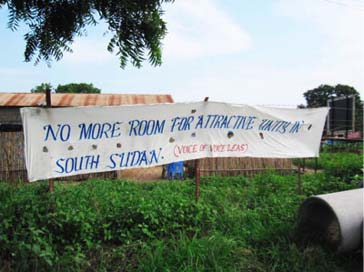
In her last field dispatch* for Enough, Maggie Fick, our South Sudan field researcher, highlights how unrealistically high expectations, disaffected youth, and local rivalries over resources could be potential triggers of conflict after the referendum on southern self-determination in January 2011. As soon as the South votes to become its own country – which Maggie points out is a taboo assumption to make outside of Sudan but is widely viewed as a given in the South – many people believe that life will immediately begin to improve. This hope has sustained southerners throughout long periods of war and the slow-moving process of implementing the Comprehensive Peace Agreement. Maggie writes:
Many southerners believe that their lives will be dramatically altered by the referendum and that life on the day after the vote will be vastly improved. The “lag time” between the referendum in January 2011 and the end of the CPA’s interim period in July 2011, which, according to the CPA, would also mark the official independence of the South, should the southerners vote for separation in the referendum, is in itself a chance for tensions to build further in anticipation of independence. However, the more significant lag time is likely to occur between independence and the delivery of even the most basic of services that a government must provide.
It is unrealistic to expect that the Government of Southern Sudan will quickly or easily transition into a highly functioning and responsive government with the capacity to extend services throughout the South’s vast and remote territory.
Youth, in particular have begun losing faith in the ability of the political system to meet their needs. As Maggie reports, they will likely become frustrated if the government does not quickly begin addressing the issues that impact them, and may resort to violence. The government of South Sudan will need to demonstrate to southerners that while building an effective new government and state will be immensely challenging, citizens themselves have an important role to play in a “New Sudan,” as envisioned by the revered former southern leader John Garang.
Read the new dispatch here.
*We said this once before, but this time it’s true. We thank her for her exceptional contributions to Enough’s work and wish her the best

